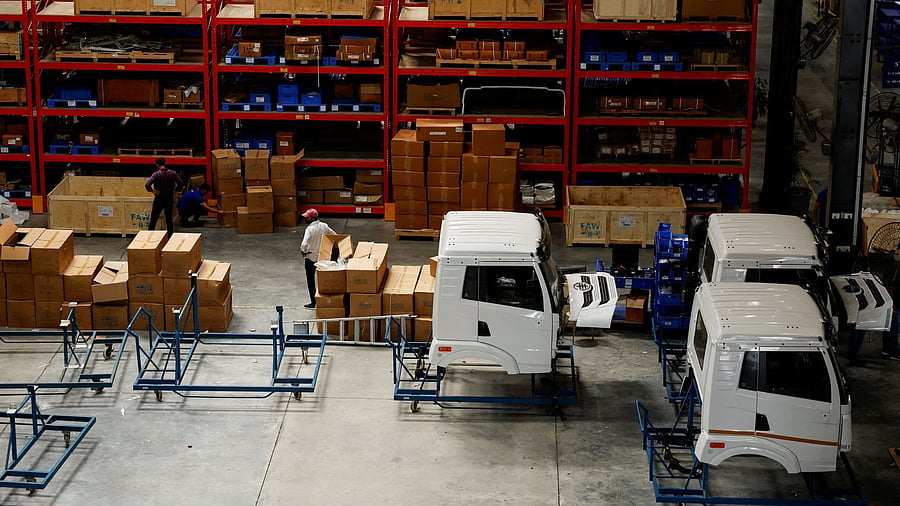
Employees work at the Blue Energy liquefied natural gas (LNG) truck manufacturing facility in Pune, India, October 11, 2024.
Credit: Reuters Photo
New Delhi: India’s manufacturing sector growth slumped to its lowest level in 14 months in February due to weak demand, even though exports increased at a healthy pace, as per an industry survey report released by S&P Global on Monday.
The Purchasing Managers’ Index (PMI) for manufacturing declined to 56.3 in February from 57.7 recorded in the previous month.
The overall pace of the manufacturing sector in February receded to its slowest since December 2023. Despite the slowdown, the sector witnessed a strong rate of expansion. A PMI reading above 50.0 signals an expansion in the sector, whereas a value below 50.0 indicates contraction.
“India recorded a 56.3 manufacturing PMI in February, down slightly from 57.7 during the prior month, but still firmly within expansionary territory,” said Pranjul Bhandari, Chief India Economist at HSBC.
New export orders rose strongly in February, as manufacturers continued to capitalise on robust global demand for their goods. “Although softer than January's near 14-year high, the pace of expansion was sharp,” S&P Global said in its monthly survey report. PMI data is based on a survey conducted among around 400 manufacturers in the country.
Despite the growth slowdown, manufacturers remained optimistic. “Business expectations also remained very strong, with nearly one-third of survey participants foreseeing greater output volumes in the year ahead,” said Bhandari.
The surveyed firms expressed “strong optimism about growth prospects for the coming year, with client demand expected to remain positive and support output.”
A majority of the manufacturers increased their workforce during the month under review. In February, the rate of job creation was the second-best in the series history, behind only that recorded in January. One-in-ten firms signalled greater recruitment activity, while 1% of companies shed jobs during the month.
The overall rate of inflation eased for the third straight month in February to its weakest in a year. There was a sharp increase in prices of bamboo, leather, rubber, telecom and marketing costs. Concurrently, the rate of charge inflation was little-changed from January, remaining above both its long-run average and that seen for input costs. Firms passed on higher labour costs to clients, facilitated by favourable demand conditions.
Pre-production inventories rose strongly in February. This was supported by a twelfth successive improvement in average lead times. Meanwhile, firms' use of warehoused goods to fulfill demand needs was reflected in fall in finished goods stocks.